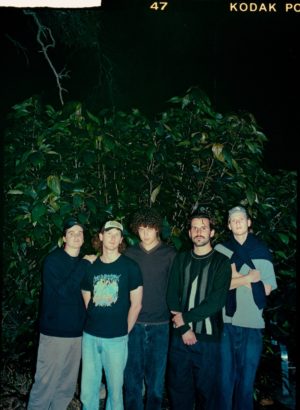Photos and feature by Lauren Khalfayan, find more of her work here.
As someone who is fairly new to New York, I can attest that the transitional period when you first move here and are trying to figure all your shit out can be all-consuming, emotionally draining, and, frankly, devastating. Throw in living in the era of social media where we’re constantly confronted by the highlight reels of our peers — the pressure to “make it” in our chosen industry can be extreme. Big Bliss have composed a debut LP that speaks to the overwhelming weight of that feeling and so much more. At Middle Distance is a deeply personal record, confronting the struggle with one’s identity, anxiety, death, and addiction. With that darkness, though, the band also has built in a sense of light. Each song is anchored by a driving drum beat, swelling melodies that can’t help but fill up every available space, and an optimistic resolution that our tomorrows can be better than our yesterdays.
I want to talk to you about the album — how you feel about it finally being out in the world. I know for this kind of thing there’s a lot of build up and sometimes with social media it feels like we’re all just screaming into the void until something sticks. Does this feel like a cathartic release, like it’s finally out there, or is it more along the lines of “we’re throwing things out there and seeing what sticks”?
Tim Race: It’s definitely not just throwing things out there. We worked really hard on this particular record as a record itself so it’s most important to us that we feel good about the record standing aside from all of the—you know—how much attention it gets. But it feels good. I mean we haven’t played yet so I’m still a little nervous, but I think once that happens—for us, it’s kind of like having this out gives us permission to work on the next record. And like we’ve been cooking these songs for a while, we really like writing stuff. I think now it’s like, “Cool, that one’s done. Onto the next one.”
Cory Race: I actually agree with that so much I don’t know if I could even expand upon that. We just wanted to make a record we would listen to, you know, and I think we felt like we did that. If no one ends up hearing it, at least we like our own record, right?
Tim: But that’s so important, like how could you—you have to stand behind what you’re doing if you’re doing such a public thing like this.
Cory: And you’re responsible for it.
On the record you talk about struggling with the concept of identity in terms of these self-identifying things that we tie ourselves to that do more harm than good a lot of the time. Do you think there are positive and healthy ways of self-identifying? Or is this cycle of self-identifying always going to be a trap?
Cory: That’s a really good question.
Tim: Of course there’s positive ways to self-identify, but I think that you have to parse the difference between the identity you’ve built and the affirmation you’re looking to receive from that identity. I think there are really positive ways. I think everybody needs something — pillars for themselves and their personality, things that they feel good about in their lives — but of course, social media has totally changed the landscape for everyone. It’s a totally different game. You exist on the internet as a separate version of yourself and only the one that you want to show people. You are your own PR agent 100% of the day and everyone’s there. And how much response you get from that, it makes sense that people tie up their self-worth to something like that cause it’s like such instant gratification, why not? And I think it’s really easy to compare yourself and your life to other people’s lives, the way they are, the way they’re displaying themselves on Facebook or wherever it is. Not to say that all of that is bad, but I think that sort of raises the stakes for how you feel about yourself on a daily basis. You wake up and you look at your phone and you get all these notifications from Facebook and it’s like, so-and-so like your photo and that’s the first thing you see. Before that [Facebook] you didn’t have somebody call you and be like, “Hey I think you look great.” Like that didn’t happen. I think it’s so ingrained in how we live now that it’s almost impossible to have this separate identity that you’ve built to be public versus the one you and maybe your friends know.
What about music as a form of self-identification? At gigs you tend to see the same kind of people, dressed the same kind of way, listening to the same kind of music and it’s almost like we all decided to act and think and dress similarly because we all like this thing.
Cory: It’s kind of the same with anything, though. It’s like we all want to belong to a club of some sort, whether we’re aware of it or not. It’s just belonging like anything else. And then the bands happen to be good too, so that helps. We’re like predetermined to be going to shows, all of us probably, so you know, I forgot the original question, I’m sorry
Tim: But it’s also like with music, with any performing art, in my opinion, there’s so much ego wrapped up in it. And you know I’m not excusing us either, nor am I saying that’s a bad thing. I think it’s necessary to get up on stage and be able to perform. I think there’s a certain ego fulfillment that you get from that. And I think that it’s like Facebook again. I would say it’s like 40% of the people I’m connected to on the internet are musicians themselves and we feel it’s necessary to promote ourselves and get ourselves out there, and we do the same thing. If you look at my Facebook page, you might only see one post about my personal life and you might see 10 about our band — says something.
Wallace May: And some about our cat.
Tim: Some about our cat. But that says something. It’s another form of belonging to a club or whatever, but I don’t think that’s a bad thing. I think it’s perfectly natural that people want to connect with each other and support each other.
Cory: It can get bad, but in and of itself that idea is not bad. That we get onstage as performers, all of us, and ego has a little bit to do with it at least, that’s not really deniable, maybe someone will deny it themselves, but they’re probably bullshitting.
Tim: But it’s so dangerous it’s like when your ego trips up, that is a recipe for disaster. I think that’s really hard for most people — taking an ego hit or whatever it is, however you see that. You see somebody else’s thing doing better than yours or you don’t get the kind of response that you wanted. That can be really difficult. I think it’s perfectly natural. It’s sort of like informing how we’re building our music scenes now and how it’s being promoted. It’s all like wrapped up in this.
Cory: You have to do a lot more on your own now than you used to. The music industry isn’t what it used to be so there’s a lot more self-promotion. I mean, I remember doing this before Facebook existed and it was way different, but I think if we put Facebook in that time and kept the music industry the same as it was, I think it would look completely different. It’s like you’re forced to self-promote, because no one’s going to do it for you, but also there’s the potential that more people can see it than ever before.
Tim: It’s definitely promoting this democratization of music and I think that’s ultimately positive, but like you said in your earlier question, it’s screaming into the void and constant content being thrown at you and you feel it’s necessary to be a part of that when you’re doing something like this. You feel like that’s the only way you can really engage. Shit like, the last time we really went out and put out fliers for a show, like really did it, I can’t even remember.
I found “Constants” really interesting because it put words to a phenomenon that I had been experiencing, but wasn’t sure how to explain. This whole, trying to find this constant state of eternal bliss, but in doing so you’re isolating yourself and it’s so self-serving. Why do you think something like that is being pursued so actively by people right now?
Tim: I don’t know if it has anything to do with the current climate. Well maybe. For me, that experience was amplified because I was in New York, moved to New York from Ohio, and the pressure that I felt to make my life work in New York with as expensive and insane as it was, was so immense and so consuming. And it was amazing, I had my brother here, I was in a relationship at the time, and I had really close friends around me, but it would take me days to respond to text messages or whatever it is. I would go to work, I would come home, I would go to work, I would come home. But I had a full life available to me. I don’t know if that’s because of where I was in my life or if New York sort of promotes that kind of lifestyle, but I think it does for sure. Why it’s happening right now, I’m not sure — there’s gotta be sort of parallels for earlier generations in different ways. But the sort of work that’s available to people like us, it’s totally different [now], you know. We’re not signing up for an industry union or whatever it is. Such a huge portion of people in New York are freelancers or artists working at bars — that lifestyle is so amorphous and anxiety-inducing and uncomfortable. But I also feel like it’s necessary if I want to do what I want to do. I work sound in media and the amount of people who work in media or media adjacent — it’s got to have increased ten-fold. I mean people are hiring crews to make Instagram videos. It’s insane. And I think as that shifts, we’re going to see more confusion as to how to set yourself up or how to build a life or build a balanced living by yourself. When I wrote that song I had no idea what I was doing and no idea how to do that.
Cory: I like how that line can be taken a couple different ways though, it’s cool. I like what you got out of it. I didn’t think of it that way, I thought of it more straight forward.
Tim: That first line of the song?
Cory: Yeah. I like the more abstract.
I’m always asking myself, “Is it that deep or am I reading way too much into everything?”
Tim: No you totally got it
A lot of your music is obviously very personal and I’m sure performing takes a lot out of you as well and now touring, how do you kind of fill back up that emotional and creative well? Do you actively seek things out or are you more like, inspiration will strike when it does?
Cory: We definitely intentionally seek things out. We go pretty hard in our practice space. We’ve gone there with nothing, or a little piece of something, and we’ll write off of that. We don’t wait. We don’t leave a lot of downtime. We started writing new songs as this record was getting ready to be released.
Tim: Even while we were mixing.
Cory: Yeah, we have like two or three that will probably be on the next recording.
Wallace: I feel like normally when we do a tour or we finish recording, we take a few days and, not that we don’t all love each other and want to see each other, but we got to go recharge. But at the same time, it’s only like a few hours before we’re like, “Ok, so when you guys want to write?” So we do take time to ourselves to recharge, but I feel like a lot of the recharging comes when we’re writing.
Tim: I think I can speak for everyone when I say that writing tunes — well, it’s my favorite aspect of of this whole thing. When we walk out of the space with a voice memo recording of a finished song, it’s so exciting to us cause it’s like, cool, that’s another one, and there will be another one, and another one. It makes us feel like we’re chasing something. And that’s the inspiration for us, you know. It’s like chasing… I don’t want to say the inspiration is just in doing it. But we don’t really wait, we’re sort of leapfrogging over ourselves all the time with new material. We probably have written, I don’t think I’m exaggerating in saying, like 100 portions of songs that we’ve taken almost an entire practice to work on.
Cory: At least 60 completed almost songs, I bet.
Tim: Easy. And they either get tossed out because we write another new one the next time we practice or we had to fix that one thing, but there’s that riff we really like
Wallace: It’s almost hard to stay on course because we get excited about the next thing and then we’re like, “We gotta go back, but this other thing is really good!” Cory is good about keeping us in line with that.
Cory: I get really picky about what songs we’re working on. I always felt like there are a few different approaches. You can wait for inspiration to strike, you can write a whole song out on your own, or you can go to practice and try stuff out. You’re not throwing shit at the wall, we’re playing together and writing stuff that sounds pretty decent, and then we write off of that. We’ve written complete songs in one practice. We’re tenacious I guess. We stay until we got stuff in there.
I think there’s an idea that artists need to live on extremes of the spectrum: you need to experience the highest highs or the lowest lows to create meaningful work. Like the whole tortured artist trope, how you need miserable experiences to create something meaningful. I can tell by your nodding that you think that’s bullshit —
Cory: I never bought into that
Tim: Yeah, I think that’s total bullshit. Our record has a lot of personal catharsis for me and hopefully reaches some more universal themes because of that. It’s definitely touching on some difficult subjects, you know. I think if an artist has to find a way to reflect their life. Whatever you’re experiencing, if that’s something you can honestly put to paper or whatever the medium is, that’s valuable. I think that’s the point: to kind of transcend the experience of your life and have a mirror of it available for people to connect to. So for me, it felt important to make sure the record subjects were honest experiences I had or reflections that we’ve had that were meaningful to me. But I also didn’t want it to be all draped in darkness. We intentionally tried to build in some sort of light to our sound that communicates that it’s not all bad, man. Even if it’s difficult or intense or whatever, that doesn’t mean it’s all bad. You don’t have to be tortured to say something, but it might be torturous to say something. To actually do the thing and feel good about it — but I don’t think that’s the trope.
At Middle Distance is out now. You can find Big Bliss on Facebook, Twitter, and Instagram.


















